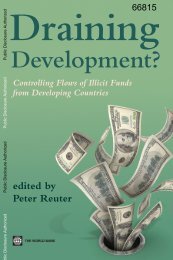International Trade in Services.pdf - DSpace at Khazar University
International Trade in Services.pdf - DSpace at Khazar University
International Trade in Services.pdf - DSpace at Khazar University
Create successful ePaper yourself
Turn your PDF publications into a flip-book with our unique Google optimized e-Paper software.
Legal <strong>Services</strong>: Does More <strong>Trade</strong> Rhyme with Better Justice 81<br />
Box 3.5: Self-Regul<strong>at</strong>ion Often Results <strong>in</strong> Carteliz<strong>at</strong>ion of the Legal Profession<br />
It is particularly challeng<strong>in</strong>g for policy makers to engage professional bodies<br />
effectively <strong>in</strong> reform. Professional associ<strong>at</strong>ions often resist <strong>in</strong>creased competition.<br />
Indeed, a weak or excessively protectionist professional body may delay the evolution<br />
of the legal profession.<br />
There is evidence th<strong>at</strong> the self-regul<strong>at</strong>ion of legal services does not work well and<br />
th<strong>at</strong> deregul<strong>at</strong>ion can have substantial benefits. For example, after the 180-year<br />
monopoly of the legal profession <strong>in</strong> the United K<strong>in</strong>gdom ended <strong>in</strong> 1983 <strong>in</strong> the<br />
provision of the services required to buy or sell real est<strong>at</strong>e, the average price for<br />
convey<strong>in</strong>g services dropped by 10 percent over the follow<strong>in</strong>g three years, despite an<br />
<strong>in</strong>crease <strong>in</strong> the value of the underly<strong>in</strong>g hous<strong>in</strong>g transactions (World Bank 2004).<br />
Moreover, consumers buy<strong>in</strong>g or sell<strong>in</strong>g real est<strong>at</strong>e after demonopoliz<strong>at</strong>ion have<br />
reported the same or gre<strong>at</strong>er s<strong>at</strong>isfaction with the services.<br />
Carteliz<strong>at</strong>ion of legal services with the associ<strong>at</strong>ed adverse impacts on pric<strong>in</strong>g and<br />
service quality is an even bigger problem <strong>in</strong> develop<strong>in</strong>g countries, <strong>in</strong> which press and<br />
public oversight is generally weaker than it is <strong>in</strong> the countries of the Organis<strong>at</strong>ion for<br />
Economic Co-oper<strong>at</strong>ion and Development. In this context, policy makers can try to<br />
facilit<strong>at</strong>e discussions between professional bodies and legal service users to help<br />
identify commercial needs th<strong>at</strong> domestic law firms can strive to meet. Expos<strong>in</strong>g<br />
professional bodies to successful counterparts is another practical means of help<strong>in</strong>g<br />
such entities adopt <strong>in</strong>tern<strong>at</strong>ional best practices. The efficiency and credibility of these<br />
approaches to br<strong>in</strong>g down prices and ensure access to high-quality legal services will<br />
be enhanced if the <strong>in</strong>iti<strong>at</strong>ives are complemented by an open<strong>in</strong>g up of parts of the<br />
domestic legal market to <strong>in</strong>tern<strong>at</strong>ional competition and by anchor<strong>in</strong>g reforms <strong>in</strong><br />
<strong>in</strong>tern<strong>at</strong>ional agreements with partner countries.<br />
to achieve a broad set of public policy objectives. For example, qualific<strong>at</strong>ion and<br />
licens<strong>in</strong>g requirements are designed to protect consumers from substandard legal<br />
advice. But the same rules also have an <strong>in</strong>fluence on market access and n<strong>at</strong>ional<br />
tre<strong>at</strong>ment and, hence, determ<strong>in</strong>e a country’s ability to particip<strong>at</strong>e <strong>in</strong> the trade <strong>in</strong><br />
legal services.<br />
In many countries, legal services are subject to a comb<strong>in</strong><strong>at</strong>ion of regul<strong>at</strong>ions<br />
and restrictions. Prevalent measures concern n<strong>at</strong>ionality and residency requirements;<br />
restrictions on <strong>in</strong>corpor<strong>at</strong>ion, partnerships, and multidiscipl<strong>in</strong>ary practices;<br />
qualific<strong>at</strong>ion requirements; the reserv<strong>at</strong>ion of certa<strong>in</strong> activities for local<br />
firms or lawyers only; and restrictions on fee sett<strong>in</strong>g and advertis<strong>in</strong>g. Indeed, <strong>in</strong> a<br />
survey of restrictions on trade <strong>in</strong> professional services, Nguyen-Hong (2000) has<br />
found th<strong>at</strong> legal services (together with account<strong>in</strong>g) were the most highly regul<strong>at</strong>ed<br />
sectors <strong>in</strong> terms of measures rel<strong>at</strong>ed to establish<strong>in</strong>g a presence and measures<br />
perta<strong>in</strong><strong>in</strong>g to cont<strong>in</strong>u<strong>in</strong>g oper<strong>at</strong>ions. Similarly, analysis by P<strong>at</strong>erson, F<strong>in</strong>k, and<br />
Ogus (2003) on regul<strong>at</strong>ion of the legal profession <strong>in</strong> European Union countries<br />
suggests a more rigid environment than, for example, <strong>in</strong> the technical professions,<br />
<strong>at</strong> least with respect to conduct regul<strong>at</strong>ions. Concern<strong>in</strong>g market entry and

















